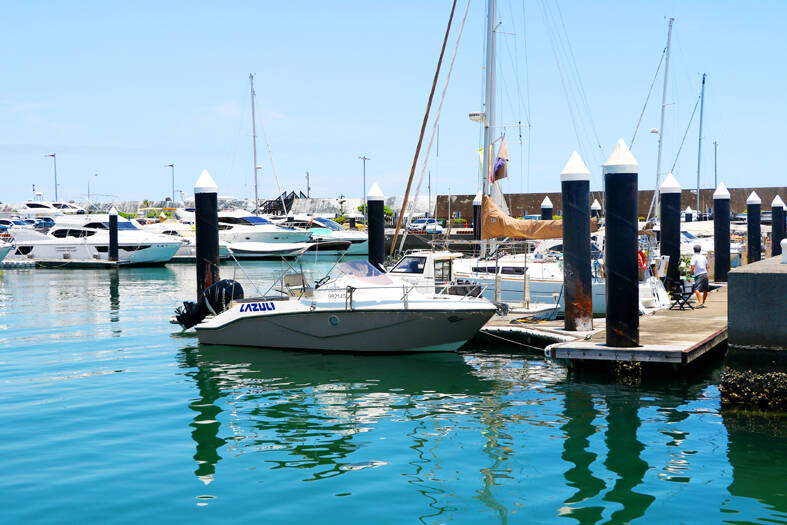The Ministry of Transportation and Communications is considering amendments to require vessels of all sizes to install automatic identification systems (AIS) in a bid to track ships near Taiwan’s shores as well as prevent Chinese incursions.
Under the Regulations for Small Ships Inspection and Measuring (小船檢查丈量規則) and the Regulations Governing the Management of Yachts (遊艇管理規則), small ships that are not used to ferry passengers are not required to install an AIS.
However, under the proposed amendment, all ships, except those on lakes, rivers and other inland waterways, would be required to install an AIS, ministry sources said this week.

Photo: Tsai Yun-jung, Taipei Times
The amendments are primarily a response to an incident in June last year, when a Chinese man was arrested after navigating a boat into a harbor near the mouth of the Tamsui River (淡水河), they said.
The changes would also help the government combat smuggling and improve operational safety for port and harbor staff, and Coast Guard Administration personnel, they said.
Under the regulations, small ships are defined as motor-powered vessels under 20 tonnes, or non-motor-powered ships under 50 tonnes, and are further separated into passenger-carrying ships, and non-passenger-carrying ships.
Yachts relying primarily on wind for propulsion with auxiliary engines are not required to install an AIS, but can instead put in radar deflectors under current regulations, but once the amendments are passed, the vessels must install an AIS, the ministry said.
Putting an AIS on small boats and yachts would help the Maritime and Port Bureau track all ships in coastal areas near Taiwan, it said.
The nation has 1,543 yachts and 13,146 small ships, with about 13,690 ships expected to install AIS should the amendments pass, the ministry said.
Ships that fail to comply with the new regulations could face fines of NT$3,000 to NT$30,000 under the Shipping Act (船舶法), it said.
A Class B AIS costs about NT$20,000, Maritime and Port Bureau Deputy Director-General Liu Chih-hung (劉志鴻) said.
The bureau is working with the Fisheries Agency to draft subsidies that would alleviate the financial burden for ship owners to install the systems, he said.
Under proposed plans, the bureau would subsidize the refitting of 4,609 ships that are not used in the fishing industry, while the Ministry of Agriculture would subsidize 9,081 ships, he said.

CHAOS: Iranians took to the streets playing celebratory music after reports of Khamenei’s death on Saturday, while mourners also gathered in Tehran yesterday Iranian Supreme Leader Ayatollah Ali Khamenei was killed in a major attack on Iran launched by Israel and the US, throwing the future of the Islamic republic into doubt and raising the risk of regional instability. Iranian state television and the state-run IRNA news agency announced the 86-year-old’s death early yesterday. US President Donald Trump said it gave Iranians their “greatest chance” to “take back” their country. The announcements came after a joint US and Israeli aerial bombardment that targeted Iranian military and governmental sites. Trump said the “heavy and pinpoint bombing” would continue through the week or as long

TRUST: The KMT said it respected the US’ timing and considerations, and hoped it would continue to honor its commitments to helping Taiwan bolster its defenses and deterrence US President Donald Trump is delaying a multibillion-dollar arms sale to Taiwan to ensure his visit to Beijing is successful, a New York Times report said. The weapons sales package has stalled in the US Department of State, the report said, citing US officials it did not identify. The White House has told agencies not to push forward ahead of Trump’s meeting with Chinese President Xi Jinping (習近平), it said. The two last month held a phone call to discuss trade and geopolitical flashpoints ahead of the summit. Xi raised the Taiwan issue and urged the US to handle arms sales to

BIG SPENDERS: Foreign investors bought the most Taiwan equities since 2005, signaling confidence that an AI boom would continue to benefit chipmakers Taiwan Semiconductor Manufacturing Co’s (TSMC, 台積電) market capitalization swelled to US$2 trillion for the first time following a 4.25 percent rally in its American depositary receipts (ADR) overnight, putting the world’s biggest contract chipmaker sixth on the list of the world’s biggest companies by market capitalization, just behind Amazon.com Inc. The site CompaniesMarketcap.com ranked TSMC ahead of Saudi Aramco and Meta Platforms Inc. The Taiwanese company’s ADRs on Tuesday surged to US$385.75 on the New York Stock Exchange, as strong demand for artificial intelligence (AI) applications led to chip supply constraints and boost revenue growth to record-breaking levels. Each TSMC ADR represents

State-run CPC Corp, Taiwan (CPC, 台灣中油) yesterday said that it had confirmed on Saturday night with its liquefied natural gas (LNG) and crude oil suppliers that shipments are proceeding as scheduled and that domestic supplies remain unaffected. The CPC yesterday announced the gasoline and diesel prices will rise by NT$0.2 and NT$0.4 per liter, respectively, starting Monday, citing Middle East tensions and blizzards in the eastern United States. CPC also iterated it has been reducing the proportion of crude oil imports from the Middle East and diversifying its supply sources in the past few years in response to geopolitical risks, expanding